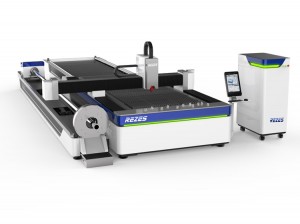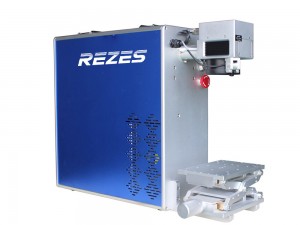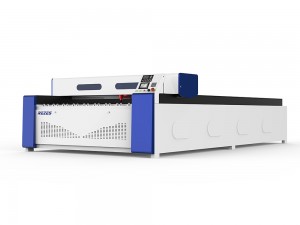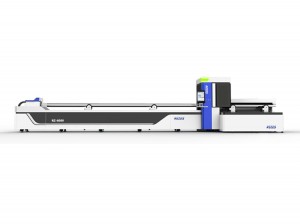Three in One Laser Welding Machine
Product Display



Technical parameter
| Application | Laser Welding Cutting and Cleaning | Applicable Material | Metal materials |
| Laser Source Brand | Raycus/MAX/BWT | CNC or Not | Yes |
| Pulse Width | 50-30000Hz | Focal Spot Diameter | 50μm |
| Output Power | 1500W/2000W/3000W | Control Software | Ruida/Qilin |
| Fiber Length | ≥10m | Wavelength | 1080 ±3nm |
| Certification | CE, ISO9001 | Cooling system | Water cooling |
| Mode of Operation | Continuous | Feature | Low maintenance |
| Machinery Test Report | Provided | Video outgoing inspection | Provided |
| Place of Origin | Jinan,Shandong Province | Warranty time | 3 years |
Machine Video
The characteristic of Three in One Laser Welding Machine
1. High energy density and high welding strength
The laser beam energy density of the continuous fiber laser welding machine is extremely high, which can quickly melt metal materials and form a solid weld. The welding strength can be equivalent to or even higher than that of the parent material.
2. Beautiful welds, no post-processing required
The welds produced by laser welding are smooth and uniform, without additional grinding or polishing, which greatly reduces the cost of post-processing. It is especially suitable for industries with high requirements for welding appearance, such as stainless steel products, metal decoration industry, etc.
3. Fast welding speed and improved production efficiency
Compared with traditional welding methods (such as TIG/MIG welding), the speed of continuous fiber laser welding machines can be increased by 2-10 times, greatly improving production efficiency, and is suitable for mass production scenarios.
4. Small heat-affected zone and small deformation
Due to the focusing characteristics of the laser, the heat input in the welding area is smaller, reducing the thermal deformation of the workpiece, especially suitable for welding precision parts, such as electronic components, medical devices, etc.
5. Can weld a variety of metal materials, with a wide range of applications
Applicable to stainless steel, carbon steel, aluminum alloy, copper, nickel alloy, titanium alloy and other metals and their alloys, widely used in automobile manufacturing, sheet metal processing, aerospace, electronic appliances, medical equipment and other industries.
6. High degree of automation, can be integrated with robot welding
Continuous fiber laser welding machine can be integrated with robots and CNC systems to achieve automated welding, improve the level of intelligent manufacturing, reduce manual intervention, and improve production consistency and stability.
7. Simple operation and low maintenance cost
The equipment adopts an industrial touch interface, adjustable parameters, and easy operation; the fiber laser has a long life (usually up to 100,000 hours) and low maintenance cost, which greatly reduces the cost of use for enterprises.
8. Support handheld and automated modes
You can choose a handheld welding head to achieve flexible welding, which is suitable for large or irregular workpieces; it can also be used with an automated workbench or robot to meet the needs of assembly line production.
9. Environmentally friendly and safe, no welding slag, no smoke and dust
Compared with traditional welding, laser welding does not produce a lot of smoke, sparks, and welding slag, which is more environmentally friendly and safe, and meets the modern industrial green manufacturing standards.
Welding samples




Service
1.Customized services:
We provide customized fiber laser welding machines, custom designed and manufactured according to customer needs. Whether it is welding content, material type or processing speed, we can adjust and optimize it according to the customer's specific requirements.
2.Pre-sales consultation and technical support:
We have an experienced team of engineers who can provide customers with professional pre-sales advice and technical support. Whether it's equipment selection, application advice or technical guidance, we can provide fast and efficient help.
3.Quick response after sales
Provide fast after-sales technical support to solve various problems encountered by customers during use.
FAQ
Q: What materials can be welded by laser welding machine?
A: Continuous fiber laser welding machine is suitable for a variety of metal materials, such as: stainless steel, carbon steel, aluminum alloy, copper, nickel alloy, titanium alloy, galvanized sheet, etc.
For highly reflective metals (such as copper, aluminum), it is necessary to select appropriate laser power and welding parameters to obtain good welding results.
Q: What is the maximum welding thickness of laser welding?
A: The welding thickness depends on the laser power.
Q: Does laser welding require shielding gas?
A: Yes, shielding gas (argon, nitrogen or mixed gas) is usually required, and its functions include:
- Prevent oxidation during welding and improve weld quality
- Reduce the generation of weld porosity and enhance welding strength
- Promote molten pool solidification and make the weld smoother
Q: What is the difference between handheld laser welding machine and automatic laser welding machine?
A: Handheld: Suitable for flexible operation, can weld irregular shapes and large workpieces, suitable for small and medium batch production.
Automation: Suitable for large-scale, standardized production, can integrate robotic arms and welding workstations to improve production efficiency.
Q: Will deformation occur during laser welding?
A: Compared with traditional welding methods, laser welding has low heat input and small heat-affected zone, and usually does not produce obvious deformation. For thinner materials, the parameters can be adjusted to reduce heat input and further reduce deformation.
Q: How long is the service life of the equipment?
A: The theoretical life of a fiber laser can reach "100,000 hours", but the actual life depends on the use environment and maintenance. Maintaining good cooling and regularly cleaning optical components can extend the life of the equipment.
Q: What issues should be paid attention to when purchasing a laser welding machine?
A:- Confirm the required welding material and thickness, and select the appropriate power
- Consider whether automated welding is needed to improve production efficiency
- Choose a reliable manufacturer to ensure equipment quality and after-sales service
- Understand whether special cooling or protection systems are required















